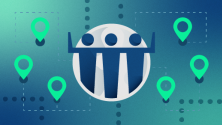When I was approached nearly five years ago now and asked to put together an edited work on how libraries can use mashups to improve services, I have to admit that I was a bit disappointed that the topic wasn't going to be open source software instead. Before the ink had even dried on my mashups book though I was offered the opportunity I wanted, a book on open source software for libraries. Now when I'm asked to speak at conferences and events the topic of interest is either open source or mashups, but never both. While there are of course differences in these two types of technologies, there are also similarities.
Open Data
Let's start with the obvious. Without open data there wouldn't be mashups. Coming from the library industry I've often heard vendors or computer services staff say "you can't have access to that," but it never sat well with me. I always wanted to know why. Why if I spent eight hours a day entering that data couldn't have access to it in any format I wanted?
The ludicrousness of it all became even clearer to me as I was doing my mashups research. There were all if these amazing APIs out there that I could use to enhance the data I was putting into our systems, but without proper access to my own data I was stuck watching organizations around the world making use of these tools instead of being able to participate in mashing up content. I've heard this phenomenon in libraries referred to as a "culture of learned helplessness." After years of being told "no" we have come to just accept that the answer is going to be "no" and we no longer ask "why" or try to find a way around the limitations.
This experience isn't limited to libraries of course. We all have been in situations where we too have come up against these barriers of entry. Being the stubborn person that I am though I couldn't accept it and so I moved away from the "culture of learned helplessness" to become an educator, teaching the power that comes along with open source and open data.
We all know that not all open source software offers complete and open access to data, but the nature of the software itself provides the user with the tools necessary to open up the data they choose, instead of being told by an outside entity what can and can't be shared openly. I refer mostly to data stored in library catalogs (the metadata used to identify the physical holdings of the library itself) and patron management systems (the metadata used to identify those who have borrowing rights at the library).
Open Source Library Systems
Two popular open source library systems (Koha and Evergreen) do exist and they both not only offer open access to the information stored within them (to those running the systems, not to just anyone on the web), but they also take advantage of open data on the web in order to generate a great big catalog mashup.
For example, both systems use APIs provided by various book jacket and book review services to mash catalog data up with book cover images and reviews written either by professionals or just book lovers on the web. The end result is a more browsing-friendly interface than most are used to in their online library catalogs, something more akin to Amazon.com than Library of Congress.
The Sky's the Limit
As tools like these grow I think we're going to see more and more mashing of library data with that from the web. Library systems (often referred to as an Integrated Library System or ILS) are full of a wealth of information which, if made available to those who support and love their libraries, might just show the world that libraries are not stuffy buildings full of books, but places of knowledge and information.
The problem as I see it is that not enough libraries have embraced the principles of open source and open data, leaving all that amazing data locked up behind proprietary systems. It's necessary for librarians to realize that they are not helpless in this and that there are alternatives out there that will allow them to reach in their systems and pull out (and bring in) tons of information.







2 Comments